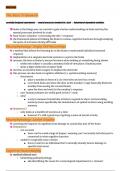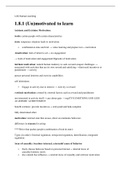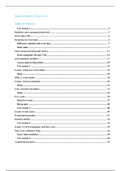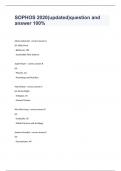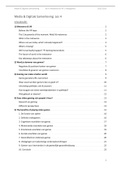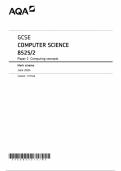Methods
The Basic Framework
carefully designed experiments → mental processes involved in a task → behavioural dependent variables
🧠looks at the things you can control to gain a better understanding on brain activity/the
ental processes involved in a task
m
🧠basic bones: stimulus→processing the info→response
🧠
the framework allows for linking the brain to various cognitive functions through studying
the spots of activation during diff tasks
Neurophysiology:Single Cell Recordings
🧠a method that allows for listening in on the brain to understand individual neuronal
response
🧠
implantation of a singular electrode system to a spot in the brain
🧠
measure the how activated a neuron becomes when looking at something being shown
○ within the subject’s (usually a monkey) field of view place a fixation point
○ shine a light within the receptive field
🧠
involves an invasive brain surgery to implant the electrode
🧠
this process can also look at cognitive abilities [i.e. spatial working memory]
○ the process
■ place a monkey in front of a cue (two holes and onehas a treat)
■ cover both holes and close the door to the monkey’s cage (basically block the
monkey from seeing the covered holes)
■ open the door and wait for the monkey’s response
○ non-human primates are really good at this (^) task
○ why?
■ a way to measure frontal lobe activity in regards to short-term/working
memory (more specifically the maintenance of spatial location using working
memory
🧠
limitation(s)
○ only looks at a handful of neurons at a time
■ however it’s still a good way of getting a sense of neural activity
Neurophysiology:Lesion Studies
🧠
assessing the impacts of cognition from damage to a particular part of the brain
🧠
limitation(s)
○ not accurate
■ there can be a wide range of impact, meaning can’t accurately tell what part is
connected to what cognitive function
○ unable to surgically cause a lesion
■ have to wait for an individual that’s naturally already faced a damage to
specific brain areas
Cognitive Neuroimaging
🧠medical/clinical uses
○ identifying pathophysiology
■ aka identifying the cause for a neurological impairment (i.e. tumour)
, localizing anatomical and/or functional disruption(s)
○
🧠basic research/experimental uses
○ structural analyses
■ examining the topography of both healthy and impaired brains
○ functional analyses
■ examining the brain functioning of both healthy and impaired brains
■ how the brain works the way it does
Computerized Axial Tomography (CT)
🧠computerized= uses a computer axial= birds-eyeview of brain/body tomograph= image
of slice of body
○ overall, it’s a 3D x-ray
🧠
provides valuable info on tissue and allows for recreating imaging of the body using tissue
absorption rates
○ diff tissues absorbs radiation at diff rates
🧠
limitation(s)
○ doesn’t provide a clear or detailed image
○ exposure to radiation isn’t good for people
■ repeated testing is not advisable
Structural Magnetic Resonance Imaging (sMRI)
🧠structural= the body magnetic= powerful magnet resonance = bounce off signal imagery=
an image
🧠
uses a very powerful magnet instead of radiation
○ the more powerful the magnet = the more better the image
○ T = tesla
■ the strength of a magnetic field
🧠
protons in the body tend to follow the powerful magnetic field and line up
🧠
a pulse of radio frequency is sent out to knock the protons out of line
○ this is “resonance”
🧠
diff parts of the body have diff levels of resonance
🧠
has extremely good spatial resolution
🧠
allows for talking about the brain in terms ofvoxel
○ 3D measurement for brain area
○ voxel is the measurement used to quantify the size of a brain injury
🧠
allows for correlating brain structure/size with behaviour
○ i.e.hippocampal size is negatively correlated withseverity of PTSD(bigger hippocampus
= less PTSD severity)
🧠
allows for finding commonality among individuals with brain injuries and the functions
impaired
○ identifying consistencies can help in determining the specific functions of specific
brain structures
Diffusion Tensor Imaging (DTI)
🧠a structural technique that solely looks at white matter
○ this technique still uses an MRI machine
🧠
the process of this technique includes jostling the subject to get their fluid moving through
their body
○ the direction of water in the brain is then measured
■ water moves more readily with white matter pathways
The Basic Framework
carefully designed experiments → mental processes involved in a task → behavioural dependent variables
🧠looks at the things you can control to gain a better understanding on brain activity/the
ental processes involved in a task
m
🧠basic bones: stimulus→processing the info→response
🧠
the framework allows for linking the brain to various cognitive functions through studying
the spots of activation during diff tasks
Neurophysiology:Single Cell Recordings
🧠a method that allows for listening in on the brain to understand individual neuronal
response
🧠
implantation of a singular electrode system to a spot in the brain
🧠
measure the how activated a neuron becomes when looking at something being shown
○ within the subject’s (usually a monkey) field of view place a fixation point
○ shine a light within the receptive field
🧠
involves an invasive brain surgery to implant the electrode
🧠
this process can also look at cognitive abilities [i.e. spatial working memory]
○ the process
■ place a monkey in front of a cue (two holes and onehas a treat)
■ cover both holes and close the door to the monkey’s cage (basically block the
monkey from seeing the covered holes)
■ open the door and wait for the monkey’s response
○ non-human primates are really good at this (^) task
○ why?
■ a way to measure frontal lobe activity in regards to short-term/working
memory (more specifically the maintenance of spatial location using working
memory
🧠
limitation(s)
○ only looks at a handful of neurons at a time
■ however it’s still a good way of getting a sense of neural activity
Neurophysiology:Lesion Studies
🧠
assessing the impacts of cognition from damage to a particular part of the brain
🧠
limitation(s)
○ not accurate
■ there can be a wide range of impact, meaning can’t accurately tell what part is
connected to what cognitive function
○ unable to surgically cause a lesion
■ have to wait for an individual that’s naturally already faced a damage to
specific brain areas
Cognitive Neuroimaging
🧠medical/clinical uses
○ identifying pathophysiology
■ aka identifying the cause for a neurological impairment (i.e. tumour)
, localizing anatomical and/or functional disruption(s)
○
🧠basic research/experimental uses
○ structural analyses
■ examining the topography of both healthy and impaired brains
○ functional analyses
■ examining the brain functioning of both healthy and impaired brains
■ how the brain works the way it does
Computerized Axial Tomography (CT)
🧠computerized= uses a computer axial= birds-eyeview of brain/body tomograph= image
of slice of body
○ overall, it’s a 3D x-ray
🧠
provides valuable info on tissue and allows for recreating imaging of the body using tissue
absorption rates
○ diff tissues absorbs radiation at diff rates
🧠
limitation(s)
○ doesn’t provide a clear or detailed image
○ exposure to radiation isn’t good for people
■ repeated testing is not advisable
Structural Magnetic Resonance Imaging (sMRI)
🧠structural= the body magnetic= powerful magnet resonance = bounce off signal imagery=
an image
🧠
uses a very powerful magnet instead of radiation
○ the more powerful the magnet = the more better the image
○ T = tesla
■ the strength of a magnetic field
🧠
protons in the body tend to follow the powerful magnetic field and line up
🧠
a pulse of radio frequency is sent out to knock the protons out of line
○ this is “resonance”
🧠
diff parts of the body have diff levels of resonance
🧠
has extremely good spatial resolution
🧠
allows for talking about the brain in terms ofvoxel
○ 3D measurement for brain area
○ voxel is the measurement used to quantify the size of a brain injury
🧠
allows for correlating brain structure/size with behaviour
○ i.e.hippocampal size is negatively correlated withseverity of PTSD(bigger hippocampus
= less PTSD severity)
🧠
allows for finding commonality among individuals with brain injuries and the functions
impaired
○ identifying consistencies can help in determining the specific functions of specific
brain structures
Diffusion Tensor Imaging (DTI)
🧠a structural technique that solely looks at white matter
○ this technique still uses an MRI machine
🧠
the process of this technique includes jostling the subject to get their fluid moving through
their body
○ the direction of water in the brain is then measured
■ water moves more readily with white matter pathways

